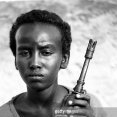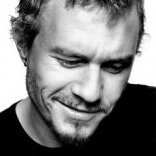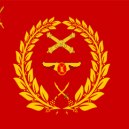Leaderboard
Popular Content
Showing content with the highest reputation since 01/25/2020 in Posts
-
4 pointsNiyaw horta comments kaagu kaama khasaarin aragti saxaad cabirtay oo aad qortay. Laakiin imika waanba sakhraansanay oo kuuma jawaabi karo indrkay talaabo wax waydiiya. Anigu geeridii nebiga ma ogiye
-
4 pointsOn the positive side this shows Somaliland is starting to realize ictiraaf isn't possible and taking more active role in the politics of Somalia.
-
4 pointsDP World completes 400 meter expansion of Somaliland’s Berbera port. 59Shares Friday August 14, 2020 DP World this week announced the completion of a 400-meter expansion of the Berbera port in Somaliland. The Dubai Port Company that is contracted to expand the port said once operational, it will increase the terminal’s capacity by 500,000 TEUs per year and further strengthen Berbera as a major regional trade hub servicing the Horn of Africa. In a tweet, DP World stated: “We have just completed a 400m quay and a new extension at Berbera Port, Somaliland. Once operational, it will increase the terminal’s capacity by 500,000 TEUs per year and will further strengthen Berbera as a major regional trade hub servicing the Horn of Africa.” The news has elicited excitement within the Somaliland government with the vice president Abdirahman Abdilahi saying: “As Deputy President of Somaliland and on behalf of the people, words can’t express my great excitement about the nearing completion of the Berbera port expansion. my gratitude goes to the Sheikhs of the UAE and the DP World.” DP world, the Dubai based world’s largest port operator is the key player in the rebuilding of Berbera, they have invested $442 million for the expansion of the port and are also the economic free zone. It has projected to complete work by February next year. advertisements In 2017 when the original agreement was signed, the CEO of DP World Mr. Sultan Ahmed bin Sulayem drew a parallel between the growth of Dubai and the development path Somaliland is on and added “Our vision is to make Berbera a trading and transportation hub for the Horn of Africa.” Berbera port is among the few corridors in the Horn of African region, which serves for both military and commercial purposes. The Berbera Port was built in 1964 by the Soviet Union and further expanded by the United States of America (USA) in 1982. It has served for both the Soviet Union and the U.S military within a span of 20 years. Once completed, facilities and service will surpass those in the neighbouring Djibouti according to the contractors. According to the DP World, the port will be able to handle the biggest ships compared to the other ports in the region and will complement activities at the Port of Djibouti and the Lamu Port which is also under expansion in the coast of Kenya. The Berbera Port expansion is the largest investment in Somaliland since it parted ways with Somalia in 1991. Work on the port expansion has reduced due to the measures put in place in the fight against the spread of the deadly coronavirus but the Somaliland government and the DP World have projected all facilities will be ready for operation early 2021. “We are very much on course. Of course the coronavirus has affected the speed at which we were on, but we will soldier on and deliver the most modern port facility in Berbera,” an official of the DP World said. The Berbera port expansion, designed to equip the Somaliland port for major vessels and transform it into one of Africa’s pre-eminent facilities. Expansion of the port started early last year with the first phase at a cost $101 million. Federico Banos-Linder, Vice President External Relations, DP World, said once the port is done, Somaliland will be one of the biggest and most modern players in the maritime industry in the Horn of Africa. “Already with phase one of the three phases done, we have increased the container capacity by 50 per cent and pushed volumes by 70 per cent which is a massive improvement. “We are now exporting 4 million livestock from 1.5 million just less than a year ago,” said Banos-Linder. Total investment of the two phases will reach $442m. The port’s current capacity is around 150,000 twenty-foot equivalent units [a measure of ships container carrying capacity] and is set to expand to 450,000 TEUs once development is complete. DP World firm will also create an economic free zone in the surrounding area, targeting a range of companies in sectors from logistics to manufacturing, and a $100m road-based economic corridor connecting Berbera with Wajaale in Ethiopia “Our aim is to make this an important regional hub for the maritime industry in the Horn of Africa,” DP World chairman and Chief Executive Officer Sultan bin Sulayem said. “We are within schedule in our work,” he added. DP World holds a 51 per cent stake in the Berbera port, while Ethiopia holds 19 per cent and Somaliland the rest
-
4 points
-
4 pointsThe recently upgraded Hagreisa land database registry is actually part of a larger project by Somaliland Gov't and SolidBlock Inc. The project will be using state of art block-chain based database to register land titles and other key assets.
-
4 pointsOodweyne They can't keep up. Befuddled, bemused and bewildered by Somaliland’s growing gravitas at international diplomacy. While they play tiddlywinks with Mudulood this and Dhuusomareeb 2.4 that. At least they're a curious bunch.
-
4 pointsThis is great improvement.The land database in Somaliland has been a consistent headache and cause for a lot of troubles including missing files, disputes etc. The introduction of GIS system will greatly simplify while at the same time is more secure and more reliable.
-
4 points
-
4 pointsAnd when they are training our navy and Air force it will be reported as a "Latin American" and an "Eastern European" country respectively
-
3 pointsLOL...it's late for me. I joined the' I like shaving my head' community.
-
3 pointsThis guy is right. If the mad man goes ahead with this destruction of our existence as free people, anyone who cares about their future should join any armed resistance movement to fight the tyrant and the criminals around him.
-
3 pointsFor those interested to learn from another example, of a major and more powerful neighbour leasing military ports and coastal lands, should read about the Kharkiv agreement between Ukrainian and Russia on Crimea Ports and what happened eventually to all of Crimea. Powerful countries do not just give up coastal areas and military ports, even if they initially agreed to a lease, and if needed they even annex the whole region, as happened with Crimea. Kharkiv Pact - Wikipedia EN.M.WIKIPEDIA.ORG Putin tears up lease for Sevastopol naval base WWW.FT.COM
-
3 points
-
3 pointsChe iyo aniga inaa nahnay the dinosaurs of Reer SOL ma'ogid miyaa. I joined SOL in Aug., 2001, though registered a few months later. Waaba 22 sano, tii/kii waagaas dhalatay/dhashay doobnimo waa dhaaftay/dhaafay.
-
3 points
-
3 pointsThis secessionist troll's obsession with 'laan' is on next level. What an incel oo ku waashay laan, laan, laan. Soco gabar raadso, not that you will find one. Also reminded me what a Reer Xamar lady in berisamaadkii said to a new neighbour who moved to her xaafad. Waqooyiga ka timid oo ku waalatay 'laandheere, laandheere.' Maalintii dambe loogu jawaabay, "Ninkaaga ku dhib qabo laankaaga dheer." From that day, ma dambe laandheerenimo lagama maqlin.
-
3 pointsSanaag and Maakhir people are the winners. They fully boycotted the Somaliland election two years ago with almost zero members, and today they 100% participated the Puntland election. No one can dispute where they belong. There is nothing more democratic than the people deciding their future by vote without fear. Of the original five districts of Sanaag, only Ceel Af Weyn did not vote.
-
3 pointsIf they ever take a legal action against any investor in the Western courts, Somaliland will have a huge opportunity to challenge Mogadishu's claims to sovereignty and expose the whole fraud the illegal "union" was built on.
-
3 pointsFarmaajo pushed the dictatorial limits and that was most likely his downfall. He was truly convinced of his own invincibility till the end. People were also tired of the continued corruption that never went away even though Farmaajo campaigned on a promise to end it. I think this was anti-Farmaajo vote than anything else. Anyways, the country needs prayers and all the help it can get because the new guy was far worse on corruption than Farmaajo. Hopefully HSM learned his lesson and comes up with new ideas to govern the country because he was truly unable to deliver anything meaningful the last time he was given the chance.
-
3 pointsThere was supposed to be choas, war and rage in Mogadishu today. I must say reer Mogadishu have disappointed us
-
3 pointsProjects that will be finalised This year. 1. Burco - Ceerigaabo Road - 300 km of fully locally funded paved road will be finished in September 2020. This road has already cut the travel time between Burco and Ceerigaabo by half. People now can have their breakfast in Hargeisa and have lunch in Ceerigaabo. A tremendous improvement. 2. Berbera corridor Road - 200km modern highway that will connect Berbera to the trading town of Togwachale will be completed by October this year. 3. Berbera Port expansion - the new 400m Berbera Port Container Terminal will be completed by October this year 4. Berbera International Airport - the newly refurbished with new 4km runway, will be opened later in the year. Projects that will be turning sod in 2020 1. Hargeisa - Burco Road via Oodweine, funded by African Development Bank and Somaliland Government, this 180km hinterland road will cut travel time between Hargeisa and Burco by 1/2. The current road via Berbera is total length 300km. The new road via Oodweine will be 180km. Travellers will be saving over 100km of fuel expense and a lot of time. This road will also help cut time to far Eastern regions i.e. time to reach Ceerigaabo will be further cut. 2. Djibouti - Jigjiga Road via Borama, also Funded by Africa Development Bank, this is 250km Road that will link Djibouti and Jigjiga passing through Borama. 3. Drill babe Drill - The first Oil well of many will get drilled this year. 4. Ceerigaabo - Mait Road - a 30km steep downhill/uphill road that winds down through Daallo Mountains and crosses Tabca Pass. This road will cut travel time to and from coastal communities. 5. Mait Fishing Port - A port that will serve as an economic hub for Sanaag regions to tab into the rich fishing seas on its shore.
-
3 pointsJapan named a scholar who teaches in China as its new ambassador.
-
3 pointsWith no visible means of support The unexpected success of Somaliland By Kieran Pender For some time now, our global landmass has been neatly divided into the 193 member states that make up the United Nations. Cartographically, the world has remained remarkably static in recent years, with just one new member admitted to the club of nations in the past decade (South Sudan) and only three in the decade before that. This stasis belies a convenient fiction, however. In a number of places, the cartography does not reflect the reality on the ground. Some examples are prominent – Palestine, say, which is recognized by over two-thirds of UN member states but lacks full acceptance on the international stage. Google Maps uses a dotted line to delineate its border with Israel. Northern Cyprus gets the same treatment: it is recognized only by Turkey. So too does Kosovo, which has received over a hundred diplomatic recognitions. Such cartographic oddities multiplied in the 1990s, during a wave of violent secessionist conflict. In the Caucasus, Abkhazia and South Ossetia broke away from Georgia following the dissolution of the Soviet Union. Georgia claims that both are now Russian-occupied; most locals disagree. Transnistria is a narrow sliver of land between Moldova and Ukraine, which seceded around the same time, as did Nagorno-Karabakh in Azerbaijan. Elsewhere, Iraqi Kurdistan, Western Sahara and Somaliland have similarly found themselves with some degree of sovereignty but without international recognition: “square pegs in a world of round holes”, according to the politics professor Deon Geldenhuys. These de facto nations have all the trappings of statehood – passports, currency, flags, elections, parliaments – but they are routinely ignored by the global community. Isolated from international institutions, formal trade networks and political blocs, such pariah territories have been routinely dismissed – including by institutions such as the European Paliament – as war-torn badlands and hotbeds of organized crime. They were also assumed by many to be transitory, and thus received little scholarly attention. But in time it became apparent that they were not going anywhere. Almost three decades since many of them were spawned, they persist – real on the ground, invisible on the map. In When There Was No Aid: War and peace in Somaliland Sarah Phillips considers a particularly peculiar example. Once a British protectorate, Somaliland enjoyed a fleeting week of independence in 1960 before merging with its southern neighbour, Italian Somaliland, to form Somalia. It was an unhappy union. Famine and oppression from the south ultimately precipitated civil war, and in 1991 (northern) Somaliland unilaterally declared independence. Most separatists have had a patron state to provide support and limited recognition. Abkhazia, for example, was recognized by Moscow in 2008 after the Russia–Georgia war – and diplomatic acknowledgement followed from several states allied with the Kremlin. The Somalilanders had no such fortune; pleas for international endorsement of their independence fell on deaf ears. Hence the title of Phillips’s book. While most post-conflict zones benefit from considerable international assistance, Somaliland has received barely a penny. International isolation and negligible aid were an inauspicious start for this fledging statelet, particularly as billions of pounds and swarms of international advisers poured into Somalia. Yet for all this assistance Somalia remains to this day racked by violence, piracy and terrorism. Somaliland, meanwhile, has emerged as a beacon of hope in the Horn of Africa – stable, relatively democratic and broadly functional. For Phillips, an expert on international development, Somaliland therefore provides a curious example of development without intervention. “For all the doubts raised about the effectiveness of international assistance in advancing peace and development,” she writes, “there are precious few examples of developing countries that are even relatively untouched by it.” As a result, it is ordinarily very difficult to consider counterfactuals, which question whether aid is actually helpful. Somaliland’s example offers partial clues. Its peace was “painstakingly negotiated under the trees at dozens of clan-based conferences”, while Somalia’s was “negotiated in five-star hotels funded by the United Nations”. Only one endured. When There Was No Aid is the result of extensive fieldwork. Phillips interviewed hundreds of people across a range of fields to understand how Somaliland secured stability while its southern neighbour remained mired in violence. She has drawn on this impressive research alongside other scholarly literature to produce a compelling account of Somaliland’s path to peace. While it is evidently written with an academic audience in mind – the book is grounded in theory and has an exhaustive reference list – When There Was No Aid is lively and accessible. Phillips makes a compelling case for the unexpected positives of non-recognition. As one minister tells her, the country’s isolation has been a “blessing in disguise”. Because the peace process was free from “institutional endpoints favored by international donors”, Somalilanders, the author tells us, “had the freedom to cherry-pick from local and international institutional governance models and to experiment”. This enabled the country to fashion innovative models blending Western governance with local customs. A system of clan-based proportional representation (the beel) was adopted, while an unelected house of elders (the Guurti) was integrated alongside a democratic two-tier legislature, presidential executive and an independent judiciary. While these structures are not faultless – Phillips suggests that the once influential Guurti has lost local legitimacy – their endurance stands in contrast to Somalia’s abiding governance crisis. Phillips’s most original contribution comes through her observation that stability has been maintained largely through words rather than actions. She suggests that while Somaliland’s institutional capabilities remain limited, and open to corruption – “the law here is fifty US dollars”, says one security official – the “othering” of Somalia’s continuing violence and the desire for international recognition have incentivized peace. Somalilanders, she argues, “have responded to institutional weakness by discursively compensating for it on the level of identity and by asserting their ability to maintain peace without strong institutions on the basis of that identity”. Her evidence for this is persuasive. She points to a contested presidential election in 2003, when many observers expected violence. Instead, the chair of the defeated party, Kulmiye, which had lost by just 0.01 per cent of the vote, publicly rejected the idea of forming a parallel government, saying: “I won’t go down that road, because no one can guarantee that we won’t end up like Mogadishu”. Phillips cites the absence of piracy in Somaliland as another measure of its success, putting this again down to the social consensus. As a local analyst tells her: “the population is alert to what the international community needs to see to recognize Somaliland. They want to protect that”. Phillips is also a shrewd detective. She highlights the pivotal role played by female activists, who can “cross clan lines” to facilitate dialogue because they hold dual clan identities – familial and matrimonial. And she identifies the centrality of one local boarding school, Sheekh Secondary – privately funded but non-fee-paying – to the country’s political make-up: of the fifty or so most influential political actors during the 1990s, fully half had attended the small, merit-based, cross-clan institution. One graduate tells Phillips that the alumni network functioned “like a secondary tribe”, aiding political cohesion during the turbulent decade. While some observers, such as the ethnologist Markus Hoehne, have called Somaliland a “sui generis” case, with little for us to learn from, Phillips disagrees. The country’s experience may have been idiosyncratic, but “this does not mean the underlying drivers of its trajectory do not have broader relevance”. In her eyes, Somaliland indicates that development institutions have been asking the “wrong question” when it comes to external intervention. “Aid matters less than we think it does because it does not alter the asymmetries that make it difficult for countries in the Global South to extract themselves from violence and poverty.” These observations are astute, and it thus seems a shame that they were crammed into the nine-page conclusion and not further explored. Today, Somaliland is no longer quite so isolated. The UN has twenty-two different agencies operating there, under the guise of its wider activities in Somalia, while the British and Danish governments have found ways to channel assistance indirectly. The United Arab Emirates is a major commercial investor and has also cooperated on security matters. In June, the presidents of Somalia and Somaliland even met in Djibouti for peace talks. “Somaliland is at a critical juncture”, Phillips observes – even if it is not yet on the map. Kieran Pender is an Australian writer and lawyer based in London. He has reported extensively from Abkhazia for the Guardian, Al Jazeera and Monocle
-
3 pointsEl-Presidente Mudane Muse Biixi has proven again that he is no-nonsense man. And by that he has won a lot of admirers from around the world and specially in the crucial and important group in the Foreign Policy circles. Africans are watching and learning from Somaliland.
-
3 pointsTaiwan is going to assist upgrading Somaliland coast guard capabilities.
-
3 pointsThere is a dedicated export only meat processing plant in Berbera funded by the UAE. I agree exporting mutton is more economically superior as both jobs and other by-products can be reused for other industries i.e. blood/gut can be used as fertiliser and skin can be processed as hide/leather.
-
3 pointsDawning of a new era. Incredible how work continues unabated at the original port at full capacity during the expansion.
-
3 points
-
3 points
-
3 pointsWAJAALE NEWS DAWLADDA ETHIOPIA OO XAFIISKEEDA HARGAYSA GAADHSIINAYSA HEER SAFAARADEED! July 20, 2020 - Written by Editor: Addis Ababa(W,N), Dawladda dalka Ethiopia ayaa xafiiska Arrima Ilaaliyaha (Mission) ee ay ku leedahay Caasimadda Somaliland ee Hargeysa gaadhsiinaysa heer Safaaradeed (Embassy), Sidaana Waxa Arabsiyo Online u sheegay Saraakiil sarsare oo ka tirsan Wasaaradaha Arrimaha Debadda ee Ethiopia iyo Somaliland, kuwaasi oo codsaday in aan la magacaabin. Sida ay Saraakiishani sheegeen, talaabadani ay dawladda Ethiopia qaadayso, waxay ka dambaysay ka dib markii ay todobaadkani dhexdiisa wada hadalo dhinaca Telefoonka ahi dhexmareen masuuliyiinta Somaliland iyo kuwa Ethiopia. Wada hadaladani ayaa la sheegay inay salka ku hayeen, ka dib markii ay dawladda Ethiopia ka shakiday ujeedada Wefti heer sare ah oo booqasho dhawr maalmood qaadatay ku yimid Somaliland. Wasiir ku xigeenka Wasaaradda Arrimaha Debada ee Jamhuuriyadda Somaliland Liibaan Yuusuf Cismaan oo waraysi arrintani la xidhiidha siiyay Wargeyska Daily News Egypt oo ah maalinle madax banaan oo ka soo baxa dalka Masar, waxa uu sheegay inay Somaliland iyo Masar isla soo qaadeen sidii ay iskaga kaashan lahaayeen is-dhexgalka dhinaca ganacsiga, gaar ahaana xoolaha iyo Beeraaha. https://dailynewsegypt.com/2020/07/18/somaliland-says-keen-on-stronger-ties-with-egypt/ Sidoo kale Mr. Liibaan Yuusuf Cismaan, Wasiir KU xigeenka Arrimaha Debada iyo Iskaashiga Caalamiga ah ee Wasaaradda Arrimaha D ebada ee Jamhuuriyadda Somaliland, waxa kale oo uu ka jawaabaay su’aalo la xidhiidha in imaatinka weftiga Masar ee Hargeysa ay cabasho ka muujisay dawladda Ethiopia, waxaanu isaga oo arrintaasi ka hadlaya yidhi. “waxaanu wada xaajood la geli karnaa dal kasta oo aanu danahayaga kala hadli karnaa, taasi waa shaqadayada’” ayuu y idhi, Wasiir ku x ixgeenku. Waxaanu intaasi ku daray oo uu yidhi. “Xidhiidhkayaga Masar wax dhaawac ah u geysn maayo, xidhiidhka aanu la leenahay Ethiopia, waxaananu ugu baaqaynaa labada dhinac ee Ethiopia iyo Masar in khilaafkooda dhinaca Biyo XIdheenka Ethiopia inay wada hadal ku dhamaystaan, haddii loo baahdana annaga laf ahaantayadu waanu dhex-dhexaadin karnaa, maadaama oo aanu khibrad u leenahay xalinta khilaafaadka” . Hase yeeshee, dawladda Ethiopia ayaa sida ay wararku sheegeen waxa ay bilawday sidii ay kor ugu qaadi lahayd xidhiidhka saaxiibtinimo ee ay la l eedahay Somaliland, tan iyo markii ay Jamhuuriyadda SOmalilanad Madax Banaanideeda kala soo noqotay dalka sannadkii 1991-kii oo ay ahayd d awladda keli ah ee iyadu goob joogga ka ahayd goobtii lagaga dhawaaqay madax banaanida Somaliland ee magaalada Burco, halka ay dawladda Masar oo waqtigaasi doonaysay inay wefti u soo d irtana la sheegayy in loo diidday saababo la xidhiidha taageero military oo ay siin jireen d awladdii hore ee Maxamed SIyaad Barre oo xasuuq baahsan ku haysay dadweynaha Somaliland sannadihii sideetamadii.. Maamulkii xilligaasi ee dalka Massar waxa uu talaabadaasi kaga jawaabay inuu u ololeeyo go’aamo go’doomin ah oo ka dhan ah madax banaanida Somaliland oo uu ka ansixiyay ururkii midnimada Afrika iyo Jaamacadda Carabtaba, aakhirkiina Qaramada Midoobay. Isku soo duuboo, khubarada caalamiga ah ee ka faaloodda arrimaha GObolku waxa ay ku sheegeen xidhiiddhka Cusub ee Somaliland Iyo Masar, mid ay ku doonayso inay noqoto dal samaysanaya saaxiibo cusub, isla markaana aan luminaayn saaxiibadiisii hore.
-
3 pointsA Somaliland delegation led by foreign minister Mr. Faratoon, had proposed a union with Republic of China (Taiwan). For the Taiwanese , since they do not share a border with Somaliland , it was a welcome joke, but the minister insisted that sharing borders with another country is not a requirement for this union to happen. He suddenly put on the table a document signed by his president and told the audience to be serious and hear him out. The Taiwanese hosts were shocked how serious the minister was and decided to give him the floor. Minister Faratoon acknowledged the seriousness of the issue and said he have to stand up to deliver the sales pitch of the century. As he begun his sermon and the merits of this union, Dr. Edna who was sitting beside him sensed that Mr. Faratoon was some what hesitating in his delivery, and jumped to eloquently set the stage. As she sat down, another member of the delegation Ahmed Yasin, jumped to the fray and said, " as the speaker of Somaliland parliament" ( he is not the speaker but the deputy , but what do the Chinese juniors know) and said we got your General Assembly seat in silver plate. The delegation explained the steps to be taken to achieve a seat at the UN for the united countries of SomTaiwa. Here are the steps: Somaliland: First, Taiwan have to spend money for Somaliland recognition in Africa. Since everyone is saying Africans should be first decide if Somaliland is to be recognized, we will buy African votes within the African Union. THere are already enough candidates willing to recognize us if the price is right. South Sudan, Guinea, Gambia, Chad, Kenya are among those who could give as the first votes. Taiwan: How much money does it take to buy these votes? Somaliland: Few hundred million dollars.. Taiwan: that is a bargain. less than a billions for a UN seat, that would be the best deal ever. We are willing to spend 5% of our sovereign wealth which is billions to achieve a UN seat. Having said that how could that translate a victory for Tiawan? Somaliland: If you are willing to pay, we could get two dozen Africans, and then repeat the same plot in Latin America places like Guatemala, El Salvador, Peru and son. Within few years we could get 50 countries who would recognize Somaliland. Taiwan: of course., but you did not answer my question. How could that benefit us? Somaliland: WE will become one united country before we start the journey. When we get the recognition you will get too. A vote of recognition for Somaliland will be a UN seat for Tiawan. Taiwan: What should we call that country? Somaliland: didn't we said earlier? It will be called SomTaiwa. Taiwan: We like the idea but we want our name Taiwan to be before yours. Like TaiwaSom. It is only fair since we are bankrolling the whole campaign. Somaliland: give us a minute, we have to discuss about this new development of the name, because we assumed SomTaiwa was the name we agreed upon. Well, now the debate had started among the delegation. Minister Faratoon and another one from west Burco insisted that we are not willing to lose the Somali word in this name change. Dr. Edna and Ahmed Yasin who are close to Biixi disagreed. They said, " We do not mind losing this Somali thing, because some us had even had thought many years ago that instead of calling us the colonial name Somaliland , we should have called ourselves Maandeeq or even Shankaroonland. Saleebaan Gaal who did not say a word in all this debate , stood up and said, I can not allow Somaliland to be swallowed by these small eyed people, let us go home and debate this back home in Somaliland. Dr. Edna jumped and said, " how do you intend to debate this in a public forum? Saleebaan Gaal: we will tell the people the usual lie and explain that Taiwan is willing to make economic integration and future free trade with us. The delegation went back to the room and told the Taiwanese, " we will be back" and left. Folks, the debate continues.
-
3 pointsKenya's Raila Odinga is expected to arrive in Hargeisa soon. There are political movements in Nairobi in support for Somaliland. Mr. Raila Odinga is a strong supporter of Somaliland.
-
3 pointsEven what you have suggested, as wild a move as they are, doesn't amount to much at all. Probably the publicity this whole thing has generated so far for Somaliland, if quantified in dollar terms, is more benefiticial than anything China can do to harm Somaliland. From the outset, I can say that China, the country, the system, the way they do business or even engage others, is not compatible with Somaliland's. They are pro-dictatorship, they do not encourage civil liberty, accountability, free press etc. The things that are dear to anyone who has a thinking mind and cherishes freedom. Whereas, Taiwan is the polar opposite to the China-Way. The Taiwan Model is about openness, liberty, freedom, democracy, free press etc. All the things I want Somaliland to be and learn. The intangible benefits of this relationship is enormous. Just consider, Taiwan sending its election observers to Somaliland. That is in itself a benefit that China cannot provide. More over, I think Israel comes to mind of a country that has successfully reserved the trend. If in the 1970s, 80s countries were all severing diplomatic ties with the Jewish state, today it is different. Many African countries are reestablishing links with Israel. Even some Arab countries are openly or covertly doing so. Hence, this new relationship between Somaliland and Taiwan is much more deeper than many have grasped. It is a win-win relationship. Taiwan is selling its model and Somaliland is the perfect place to help create a reality of that model. A strong selling point for Taiwan to other countries, of what they are missing out. Hopefully reversing the trend.
-
3 pointsTaiwan trains counter-terrorism troops for Middle Eastern country Taiwan's 42-year-old MPSSC has already trained one group of recruits while another on hold due to pandemic, local media claims 3454 By Sophia Yang, Taiwan News, Staff Writer 2020/05/09 13:55 MPSSC in 2017. (Wikimedia Commons photo) TAIPEI (Taiwan News) — A high-ranking military official has claimed that a Middle Eastern country has inked a training agreement with Taiwan, according to a Liberty Times Net (LTN) exclusive story. Under the deal, Taiwan's Military Police Special Services Company (MPSSC), under the Military Police Command, is responsible for coaching the Middle Eastern country's counter-terrorism force. They will travel to Taiwan in groups for training that will enhance their knowledge, skill, and responsiveness in the war against terror. Similar to the United States Army Special Forces (Green Berets), the MPSSC was established in 1978 and has earned international acclaim for counter-terrorism operations and protecting high-ranking officials and ambassadors in Taiwan. It is also known for anti-hijacking and anti-sabotage operations. Taiwan is one of the few Asian countries capable of training special task forces and providing such services to other countries, according to LTN. It reported the first batch of trainees has concluded training and returned to home, while a second batch of recruits is on hold due to the COVID-19 pandemic. https://www.taiwannews.com.tw/en/news/3930970?fbclid=IwAR0emABRyt6O1Tu0X9gkWMx7vMox2MgKtLVwCAOv3zIB_heUQwd_e2IfBps Rumours has it that it's Somaliland.
-
3 pointsKolka xooluhu kugu mudaharaadaan, waa laguu yaaba. .
-
3 pointsPhotoshop wey dhaaftay markaan. Muuse Muqayil inay tuuji dhexda yaalo camal ku fadhiisiyaan ayee keeneen. Eebboow adigaa heybad dad siiyo wretched secessionist bilaa xishoodka u astur isku xaarkooda.
-
3 pointsSomaliland has the best case in africa legally really. It's just that lack of economic interest from western powers is the problem. But it has shown the world that Somaliland is here to stay and that no one in Somalia can change that. Deep inside most of the koonfurians know this to the 2 countries. Have been to seperate countries for almost 3 decades this will surpass the short lived union of 20 years. In the later half of afweyne reign somaliland was at war with Somalia. In the end runtay tegeysa.
-
3 pointsI don't see astaan dowladnimo I see 5 guys who are under the payroll of the EU and the US who wear fancy suits while hiding inside a bunker protected by African Union troops. These people don't rule or control anything.
-
3 pointsKhayre has failed. Even a child knows that this Sufi outlaw was hungry for power. He knew his rule was over if elections took place in Galmudug. Farmaajo is also pushing a well known " Budhcad Badeed" named Qoor Qoor as the future leader. The best option is for Khayre and company to swallow their pride, accept defeat and keep Xaaf to rule until a real reconciliation takes place in Galmudug. If he keep insisting on his failed policy, Khayre will create three presidents within the three main sub clans of GAlmudug. Nin Saaxiibkay ah ayaa yidhi isagoo kaftamaya, " Reer Dayniile ayaa maamul HG u Samaynaya waxay ahayd riyo beena".
-
Newsletter


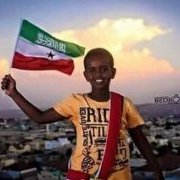

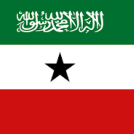
.thumb.jpeg.79edf7e652eaa56ebe85e2c649f6cd14.jpeg)



